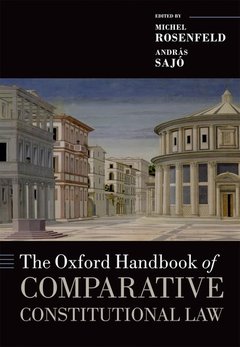The Oxford Handbook of Comparative Constitutional Law Oxford Handbooks Series
Langue : Anglais
Coordonnateurs : Rosenfeld Michel, Sajó András

The field of comparative constitutional law has grown immensely over the past couple of decades. Once a minor and obscure adjunct to the field of domestic constitutional law, comparative constitutional law has now moved front and centre. Driven by the global spread of democratic government and the expansion of international human rights law, the prominence and visibility of the field, among judges, politicians, and scholars has grown exponentially. Even in the United States, where domestic constitutional exclusivism has traditionally held a firm grip, use of comparative constitutional materials has become the subject of a lively and much publicized controversy among various justices of the U.S. Supreme Court. The trend towards harmonization and international borrowing has been controversial. Whereas it seems fair to assume that there ought to be great convergence among industrialized democracies over the uses and functions of commercial contracts, that seems far from the case in constitutional law. Can a parliamentary democracy be compared to a presidential one? A federal republic to a unitary one? Moreover, what about differences in ideology or national identity? Can constitutional rights deployed in a libertarian context be profitably compared to those at work in a social welfare context? Is it perilous to compare minority rights in a multi-ethnic state to those in its ethnically homogeneous counterparts? These controversies form the background to the field of comparative constitutional law, challenging not only legal scholars, but also those in other fields, such as philosophy and political theory. Providing the first single-volume, comprehensive reference resource, the Oxford Handbook of Comparative Constitutional Law will be an essential road map to the field for all those working within it, or encountering it for the first time. Leading experts in the field examine the history and methodology of the discipline, the central concepts of constitutional law, constitutional processes, and institutions - from legislative reform to judicial interpretation, rights, and emerging trends.
Part I: History, Methodology, and Typology. 1. Comparative Constitutional Law: A Contested Domain. 2. Methodologies. 3. Carving out Typologies: Accounting for System Differences. 4. Types of Constitution in Contemporary History from 18th Century Classic Liberal to Post-Colonial and Post Authoritarian. 5. Constitutionalism in Illiberal Polities. 6. Constitutionalism Under the Constraints of Poverty. 7. The Place of Constitutional Law in the Legal System. Part II: Ideas. 8. Constitutionalism. 9. Constitution. 10. Rule of Law. 11. Democracy. 12. Conceptions of the State. 13. Rights and Liberties as Concepts. 14. Constitutions and the Public/Private Divide. 15. State Neutrality. 16. The Constitution and Justice. 17. Sovereignty. 18. Dignity and Autonomy. 19. Gendered Visions of the Constitution. Part III: Process. 20. Constitution-Making as a Process. 21. Emergencies. 22. War Powers. 23. Self-Determination and Secession. 24. Referendum. 25. Elections. Part IV: Architecture. 26. Horizontal Structuring. 27. Vertical Structuring. 28. Internal Ordering in the Unitary State. 29. The Constitution and Powers of the Judiciary. 30. Presidentialism. 31. Parliamentarism. 32. Regulatory State. Part V: Meanings/Textures. 33. Interpreting the Constitution. 34. Proportionality (1). 35. Proportionality (2). 36. Constitutional Identity. 37. Constitutional Values and Principles. Part VI: Institutions. 38. Ensuring Constitutional Efficacy. 39. Constitutional Courts. 40. Judiciary and Judicial Independence. 41. Political Parties. Part VII: Rights. 42. Freedom of Expression. 43. Freedom of Religion. 44. Due Process. 45. Associative Rights. 46. Privacy. 47. Equality. 48. Citizenship. 49. Social Rights. 50. Rights in Economic Life. Part VIII: Overlapping Rights. 51. Abortion. 52. Rights Based on Sexual Orientation. 53. Group Rights. 54. Affirmative Action. 55. Bioethics. Part IX: Trends. 56. Internationalization of Constitutional Law. 57. European Constitution. 58. Constitutionalization of International Law. 59. Constitutional Transformation and Transitional Justice. 60. Islam and Constitutional Ordering. 61. International Constitutional Courts. 62. ECtHR Jurisprudence on the Constitutional Systems of Europe. 63. Militant Democracy. 64. Constitutional Borrowing and Transplants. 65. History of Comparative Constitutional Law. 66. The Use of Comparative Constitutional Law in Constitutional Adjudication.
Michel Rosenfeld is the Justice Sydney L. Robins Professor of Human Rights at the Benjamin N. Cardozo School of Law, where he is also Director of the Program on Global and Comparative Constitutional Theory. He is the co-editor-in-chief of International Journal of Constitutional Law and the author or co-editor of numerous books, including Law, Justice, Democracy, and the Clash of Cultures: A Pluralist Account (2010) and The Identity of the Constitutional Subject: Selfhood, Citizenship, Culture and Community (2009). Professor Rosenfeld is the recipient of the French government's highest and most prestigious award, the Legion of Honour. András Sajó is a judge at the European Court of Human Rights, Strasbourg. He is also a University Professor at CEU and Global Visiting Professor of Law at New York University Law School. Professor Sajó was the founding dean of Legal Studies at CEU. He is the author or editor of numerous books, including, with Michel Rosenfeld, Norman Dawson, and Susanne Baer, Comparative Constitutions: Cases and Materials (2003).
Date de parution : 05-2012
Ouvrage de 1416 p.
17.1x24.6 cm
Thèmes de The Oxford Handbook of Comparative Constitutional Law :
© 2024 LAVOISIER S.A.S.



